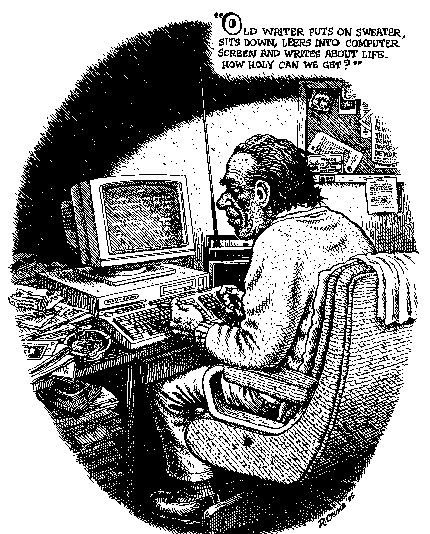Without
A Stage
The Art of Literary Translation
Robert Wechsler
(Catbird Press)

So there you have the two extremes, and caught between, the translators themselves: unknown, unloved, and at an average pay of seven cents a word, vastly underpaid. Robert Wechsler speaks out for this shadowy art. With the same subtlety and care that he attributes to the best translations, he reveals the techniques and philosophies which have guided translators from ancient times to the present. In the past, translators expected to add their own gloss to the work, as a musician interprets the music she plays, but modern readers prefer a more literal translation. Content has prevailed over form.
Wechsler argues for balance. So many differences separate cultures and periods of history: the careful translator must absorb the author's other works and his intentions as well as the ambience of his age. They must unravel sentences in one language and knit them together into another, trying to retain the power of the structure and of course, the meaning. Jokes are notoriously poor travelers. Imagine trying to translate humor into a language where the same things just aren't funny. Or poetry, which depends so often on what is not said. The translator's job is not easy, and like the defensive backs on a football team, their failures are costly and their successes mostly unnoticed. Performing Without a Stage is full of insights by people who care very much about thoughts and words, and very little about wealth or fame. Their's is a labor of love, for as Wechsler notes, Wechsler shows examples, quotes translators and uses his own eloquence to move this book along. He shares the passion and the joy he describes as the translator's reward. It's a rich book, not to be read quickly, but if you care about literature, you will love this homage to "the most visible performing art." there is no selling out in the field of translation. Is there any other sort of artist in America who is unable to sell out, even if he wants to?
Landscapes
Of Wonder
Bhikkhu Nayanasobhano
(Wisdom)
- But my good man, did you not see among people a woman or a man aged eighty, ninety or a hundred years, frail, bent like a roof gable, crooked, leaning on a stick, shakily going along, ailing, his youth and vigor gone, with broken teeth, with gray and scanty hair or none, wrinkled, with blotched limbs?...My good man, did it never occur to you who are ingelligent and old enough, "I too am subject to old age and cannot escape it. Let me now do noble deeds by body, speech, and mind?"
This truth, the truth of old age and death, should lead us to the eight-fold path: right view, right intention, right speech, right action, right livelyhood, right effort, right mindfulness, and right concentration. (Some translators prefer to use concepts like "balanced view" or "appropriate view" --- to get away from the moral imperative implicit in the word "right.")
Bhikkhu Nayanasobhano wants to be sure, as we embark on this path, that we ground ourselves in the world. For this reason, many of the chapters of this book --- perhaps too many --- are spent wandering around on snowy grounds, looking at broken branches, fallen trees, and dead leaves, thinking Big Thoughts. The message: Buddhist theory, and all that other stuff inside you is meaningless, unless you tie it to the world outside.
Although Landscapes of Wonder does tend to amble about a bit too much in the snow-filled forest, there are still some worthy insights for those dragging our asses along The Path. For instance, for those who are waiting around until old age before they embark on the journey of practice, remember, Bhikkhu Nayanasobhano tells us the time is now. Waiting is possibly a function of vanity and temporalness ("I just don't have time to get started yet...") but we should recall that
- ....the body is ultimately just rupa or matter, just neutral material elements in dynamic and temporary association; but on account of ignorance it becomes a focus of ferocious craving, fascination, lust, fear, obsession, and vanity. Mindful contempation of the body's unsually ignored unattractive aspects serves to put the over-reaching mind back to a healthy balance.
This book is a good one for those in the intermediate stages of Buddhist study. And there are enough aphorisms to make it worth it: "Beauty is a poison only if we swallow it; when we use it as the ground for reflection it may prove gracious and inspiring."
Of the Heart
Lawrence Ferlinghetti
(New Directions)
Don't grieve for him yet. Ferlinghetti is no dummy. He probably knows that the juices have run out, and what he produces now is but a shadow play of the pith and heat from back then. Let us honor him in this by not savaging A Far Rockaway Of the Heart but, instead, by remembering him as a master of yore, and knowing, in an emergency, we can order up --- from his own book publishing company (City Lights in San Francisco) --- the wonderful, haunting, sweet, gently wry Coney Island of the Mind.
He is still our hero, like Tennyson's Ulysses: still willing to kick against the pricks,
- The long day wanes, the slow moon climbs, the deep
Moans round with many voices. Come my friends,
'Tis not too late to seek a newer world...
Let us praise him by remembering what he gave us so long ago: words wonderfully articulate, deranged, funny --- and so right on. Let these not be dimmed by the faint shadows he casts today.
Out to Lunch and
The Sailors Have
Taken Over
The Ship
Charles Bukowski
(Black Sparrow)
- It's my new consoler. My writing has doubled in power and output since I got it. It's a magic thing. I sit in front of it like most people sit in front of their tv sets.
Like your present reviewer, Bukowski loved Sherwood Anderson. Anderson played with words, he says:
- as if they were rocks, or bits of food to be eaten. He PAINTED his words on paper. And they were so simple that you felt rushes of light, doors opening, walls glistening. You could see rugs and shoes and fingers. He had the words. Delightful. Yet, they were like bullets too. They could take you right out. Sherwood Anderson knew something, he had the instinct. Hemingway tried too hard.
Reading Bukowski is like being in a good Dublin Pub. The atmosphere is heady, filled with laughter and despair, words are tumbling out --- some dandy, some merely all right --- but you just don't want to leave, or shut the book. The throw-aways can knock you out:
- I plunge into the water, being aware of my stupid whiteness, of my age hanging onto me like a leech.
- I see Hemingway as a fellow who practiced ballet behind closed doors. I see Celine as a fellow who had problems sleeping. I see e. e. cummings as a great pool player.
- How did Dostoevsky cut his toenails? Van Gogh? Beethoven?
- In 4,000 years we won't have any legs, we'll wiggle along on our assholes, or maybe we'll just roll along like tumbleweeds.
 In one sense, Bukowski is wrong. He says that his writing here is better than ever, something he attributes to the computer. Not so: sometimes the sparks are here, but there's no story line that picks you up like a cat picks up a mouse, toys with you, shakes you, and everytime you try to crawl away, it reaches back to pester you some more. For real Bukowski, one should read Post Office or Notes of a Dirty Old Man or Ham on Rye. But The Captain will do in a pinch, although it has more than a touch of sadness, Bukowski now being, at age seventy-five --- he'd loathe this phrase --- "all fagged out." They got R. Crumb to contribute a dozen or so cartoons. Like the writing, it's good but not great, seems somewhat fagged out too.
In one sense, Bukowski is wrong. He says that his writing here is better than ever, something he attributes to the computer. Not so: sometimes the sparks are here, but there's no story line that picks you up like a cat picks up a mouse, toys with you, shakes you, and everytime you try to crawl away, it reaches back to pester you some more. For real Bukowski, one should read Post Office or Notes of a Dirty Old Man or Ham on Rye. But The Captain will do in a pinch, although it has more than a touch of sadness, Bukowski now being, at age seventy-five --- he'd loathe this phrase --- "all fagged out." They got R. Crumb to contribute a dozen or so cartoons. Like the writing, it's good but not great, seems somewhat fagged out too.